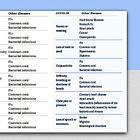After reading my piece about the possible risks of COVID-19 vaccines for pregnant women and embryos, you may be wondering if there are any legal frameworks or agreements in place that could have prevented the threat.
Numerous countries have established laws and regulations that limit the administration of experimental products, including pharmaceuticals and medical interventions, to pregnant women and children due to the associated risks. Although these regulations differ from one nation to another, there are typically stringent ethical standards and guidelines designed to safeguard vulnerable groups, such as pregnant women and children, from exposure to experimental treatments.
🔔 Regardless of the narratives presented by the media, politicians, and pharma advocates, the truth is that COVID vaccines are classified as experimental.
We can push the boundaries of technology, but we must not alter the essence of biology.
I hold a Certificate in "Ethical and Regulatory Aspects of Clinical Research" from Johns Hopkins University School of Medicine in Baltimore, MD, USA. Here is a brief review of the regulations designed to protect vulnerable populations, such as pregnant women and children 👇.
United States
In the United States, there are several regulations that protect pregnant women and children from experimental products:
The Federal Food, Drug, and Cosmetic Act (FDCA)
The U.S. Food and Drug Administration (FDA) regulates the approval and use of drugs and medical products. Generally, the FDA requires that clinical trials of experimental drugs or treatments exclude pregnant women and children to ensure safety.FDA Pregnancy and Lactation Labeling Rule
The FDA has specific rules for labeling drugs that indicate whether a drug is safe for use during pregnancy or lactation. Drugs that have not been adequately tested on pregnant women are typically labeled with warnings or contraindications regarding use during pregnancy.The Common Rule (45 CFR 46)
The Common Rule, which governs the ethics of research involving human subjects in the U.S., has special provisions for protecting vulnerable populations, including pregnant women, fetuses, and children. Research involving these populations requires additional ethical oversight and justification.The Pediatric Research Equity Act (PREA)
This law requires that pharmaceutical companies conduct pediatric studies on certain drugs to ensure they are safe and effective for children. However, experimental drugs and treatments are generally not tested on children.
European Union
The European Union has similar protections for pregnant women and children in clinical trials:
Regulation (EC) No 1901/2006 on Medicinal Products for Paediatric Use
This regulation requires that pharmaceutical companies conduct appropriate studies on medicines to ensure they are safe for use in children. Experimental drugs must undergo stringent ethical reviews, and trials involving pregnant women or children are limited to situations where the benefit-risk ratio justifies their participation. ✨ COVID doesn't exist, so there is no such thing.European Medicines Agency (EMA)
The EMA sets guidelines for clinical trials, including those involving pregnant women and children. It generally restricts the use of experimental products on these groups unless there is no other alternative, and the trial is highly regulated to ensure safety.Directive 2001/20/EC (Clinical Trials Directive)
This directive sets out rules on conducting clinical trials in the EU, emphasizing the protection of vulnerable populations. It requires that pregnant women and children are only included in trials if there is a direct benefit to them and if the risk is minimized.
Canada
In Canada, the Food and Drugs Act and related regulations govern the approval and use of drugs, including experimental products. The Tri-Council Policy Statement (TCPS 2) on research ethics outlines strict rules for including vulnerable populations like pregnant women and children in clinical trials, focusing on ensuring informed consent and minimizing risks. Experimental drugs are generally not tested on pregnant women or children.
Australia
Australia also has strict guidelines for experimental drugs and treatments:
The Therapeutic Goods Administration (TGA)
The TGA regulates the safety, efficacy, and quality of drugs and medical devices in Australia. Experimental products are generally not approved for use in pregnant women or children unless they are specifically authorized under strict conditions.National Statement on Ethical Conduct in Human Research
This document, governed by the National Health and Medical Research Council (NHMRC), sets out the ethical framework for conducting research involving humans in Australia. Pregnant women and children are considered vulnerable populations, and specific ethical considerations are required for their inclusion in research.
International Ethical Guidelines
The Declaration of Helsinki (World Medical Association)
This is an international ethical guideline for conducting medical research involving human participants. It emphasizes the protection of vulnerable populations, including pregnant women and children, in medical research. It outlines that pregnant women should not be included in clinical trials unless the research specifically focuses on a condition affecting them, and the risk to the fetus is minimized.The International Conference on Harmonisation (ICH) Guidelines These guidelines ensure that clinical trials involving new drugs are conducted according to internationally recognized standards, and they include provisions for protecting vulnerable populations, including children and pregnant women.
Bottom Line
Most countries have laws, regulations, and ethical guidelines in place to prevent the use of experimental products on pregnant women and children. These laws aim to minimize risks and ensure that the rights and safety of vulnerable individuals are prioritized in medical research and treatment.
However, these regulations were ignored when COVID vaccines were reccomended and even mandated.
This violation of ethical laws happened primarily because many government organizations appear to be more aligned with corporate interests and significantly influenced by pharmaceutical lobbyists. Furthermore, many politicians accept financial assistance from pharmaceutical companies.
Check my articles on the topic 👇.
An obvious illustration of this is the tale of the hemp plant's demise, which shows how lobbying and corporate interests have influenced laws at the price of moral principles and the good of all people.
We can't let this slide! SHARE, and demand change!
Dear Readers,
This work takes a lot of time, effort, and resources, and even puts my life at risk. If you haven’t read my story yet, take a moment to check it out 👇
I depend on the generosity of compassionate supporters like you who believe in my mission, as I do not sell products, have sponsors, or receive backing from mainstream media. Moreover, your contributions ensure that this information remains accessible to all.
📢 Recently, there hasn't been much support, which is disheartening to be honest. I’m at a point where I may limit access to my work to those who genuinely appreciate it. If you think that's unfair, now's the time to show your support and help make sure my posts can reach and benefit everyone.
You can help me by:
✨ becoming a paid subscriber or a founding member 👇
✨ making a one-time donation through PayPal or direct transfer on my blog https://genuineprospect.com.
🔔 A friendly reminder that no one works for free, and nothing is free for me.
Extra Read
https://www.fda.gov/media/112195/download
https://www.hhs.gov/ohrp/regulations-and-policy/regulations/45-cfr-46/index.html
https://www.congress.gov/108/plaws/publ155/PLAW-108publ155.pdf
https://health.ec.europa.eu/medicinal-products/clinical-trials/clinical-trials-directive-200120ec_en
https://ethics.gc.ca/eng/policy-politique_tcps2-eptc2_2022.html
https://health.ec.europa.eu/document/download/c1f2ff4c-63d0-4118-a6d6-a78197f04922_en
https://www.wma.net/policies-post/wma-declaration-of-helsinki/
https://www.ich.org/page/ich-guidelines
https://www.drugwatch.com/news/2012/01/18/pharmaceutical-companies-bribing-doctors/
https://jamanetwork.com/journals/jamainternalmedicine/fullarticle/2762509
https://www.madinamerica.com/2020/03/pharma-spent-6-billion-lobbying-politicians-last-20-years/
https://www.theguardian.com/us-news/2017/oct/19/big-pharma-money-lobbying-us-opioid-crisis














